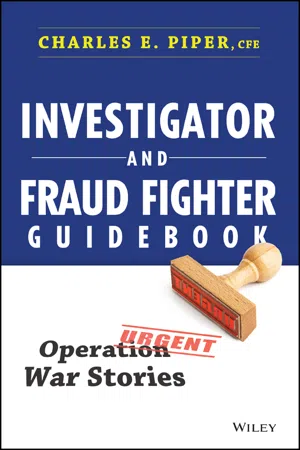
- English
- ePUB (mobile friendly)
- Available on iOS & Android
About This Book
Get federal investigative insight and guidance on conducting thorough investigations and case-building
The ability to conduct thorough and effective investigations is a skill that has become increasingly in-demand across many industries. At the same time, investigative resources are dwindling as markets recede. Regulation and financial hurdles impede traditional investigation processes. Even seasoned professionals are finding themselves overtasked or lacking the experience to pursue the types of cases that are accumulating.
In Investigator and Fraud Fighter Guidebook: Operation War Stories, author Charles E. Piper, CFE provides insight and guidance on how to conduct thorough and complete investigations while juggling a caseload. Piper served over 30 years in law enforcement-including 20 as an award-winning Federal Special Agent-Criminal Investigator. His wide array of experience allows him to lend a high-level perspective to the art and science of professional investigations of criminal, civil, and administrative cases. In the book, Piper provides guidance on conducting thorough and complete investigations (even with fewer resources) and spotting red flags that often indicate big-picture problems. Piper also shows how to:
- Identify the suspect's other wrongful acts (similar and otherwise)
- Identify similar wrongful acts committed by others, and predict future occurrences
- Identify systemic weaknesses, waste, and abuse
- Identify changes and corrections necessary to prevent future occurrences
The book includes Piper's real-life investigative examples to illustrate important concepts. Whether the matter is public, private, or military, the same basic investigative principles apply. Things that may seem totally unrelated may hold the keys that crack the cases. The Investigator and Fraud Fighter Guidebook: Operation War Stories provides the acumen and judgment required to pick up on these clues and successfully conclude investigations.
Frequently asked questions
Chapter 1
The Successful Investigator
“Some investigators have 20 years of experience; others have one year of experience 20 times.”–Senior federal agent
War Story 1.1
The Basics
Investigators
- Possess integrity (be honest).
- Have certain job skills (acquired through training and/or experience).
- Have knowledge of many aspects of law (e.g., knowledge of others’ right to privacy, the rules of evidence, and the elements of criminal offenses, etc.).
- Be dedicated to the job (willing to go beyond the call of duty).
- Be persistent (not willing to give up just because the going gets tough).
- Be self-motivated (don’t need someone else telling them what to do or when to do it).
- Be resourceful (maximize the use of resources and be cost conscious where possible).
If You Have the PIG, You Have It Made
War Story 1.2
Table of contents
- Cover
- Epigraph
- Titlepage
- Copyright
- Contents
- Preface
- Acknowledgments
- Chapter 1 The Successful Investigator
- Chapter 2 Case Initiation
- Chapter 3 Conducting Thorough Investigations
- Chapter 4 Expanding Investigative Efforts
- Chapter 5 Fraud, Waste, Abuse, and Systemic Weaknesses
- Chapter 6 Summary Reports
- Chapter 7 The Investigator’s Toolbox: Resources, Tools, and Techniques
- Chapter 8 Interviewing
- Chapter 9 Case Planning
- Chapter 10 Large-Scale Investigations
- Chapter 11 Making Presentations
- Chapter 12 Providing Testimony
- Chapter 13 Closing the Case
- Chapter 14 Personal and Professional Growth
- Conclusion
- Appendix Samples of Case Presentation Visual Aids
- About the Author
- Index